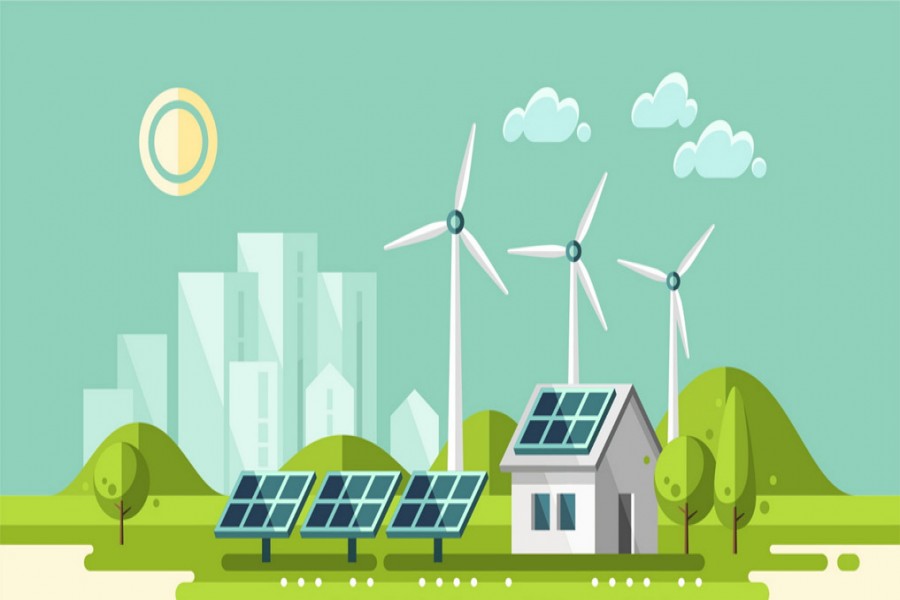
Published :
Updated :

Energy security, as defined by the International Energy Agency (IEA) as uninterrupted supply of energy at reasonable prices, has both external and internal factors. It can be ensured through local adequacy, i.e., abundant and varied forms of indigenous energy resources but countries that face local shortages, as we do, depend on import. However, internal measures could cut back reliance on external sources.
The internal dimension of energy security necessitates funding for maintenance of existing electricity networks as well as extension in the light of growing demand for electricity and government's goal to ensure access to electricity. Other internal dimension of energy security is investment in resource exploration comprising both traditional and alternative sources, which can sharply reduce reliance on imports.
Internal dimension of energy security also includes efficient utilisation of energy. Energy efficiency gain at the end-users does not only lower costs for them but also reduces the demand for production. In the industrial sector, enhancing energy efficiency leads to lesser use of energy per unit of production and thus helps in decoupling energy-input and economic growth. In promoting energy efficiency through encouraging adoption of efficient technologies, energy conservation is also crucial to work on to minimise wastage-- be it due to behavioural or other reasons. In addition, there is the scope to minimise transmission and distribution losses.
However, in last decade, we were mostly obsessed with power security rather than energy security. Against the growing demand and looming shortage of natural gas, the initiatives to explore local gas resources were not geared up to requirement. Following settlement of maritime boundaries with Myanmar and India, Bangladesh has thus far done very little to explore gas. At the same time, the government pays much higher price to the private entities producing power from liquid fuels compared with the average production cost of electricity. Now, LNG is being imported, costing significantly more than the price of local gas. As things stand, the reliance on imported fuels would continue to be on the increasing trajectory unless we make a shift from business-as-usual to increase investment on gas exploration.
As far as transmission and distribution losses consisting of technical and non-technical aspects are concerned, over the period from 2001 to 2018, there has been notable improvement from 27.97 to 11.87 per cent loss, according to Power Cell. This means that 11.87 per cent of total electricity being generated doesn't reach the intended consumers. On the other hand, the global average of combined transmission and distribution losses stood at 8.25 per cent in 2014. As such, there is no scope for complacency.
While efforts on solar and wind are yet to yield significant result, the net metering guideline of the government would help the renewable energy sector in general. Business entities could undertake rooftop solar projects, particularly in cities, to generate power from solar, meet their own demand and supply surplus electricity to the grid. The cost of solar power, which is currently less than electricity generated from coal internationally, is also favourable. While the goal of generating 2,000 MW electricity by 2020 might not be possible to meet, the net metering guideline along with the low price of solar would certainly boost the sector.
Energy efficiency provides plentiful opportunities in Bangladesh in the industrial sectors, commercial buildings and households. The government intends to reduce 8,000 MW electricity by 2030, according to energy efficiency and conservation master plan, through energy efficiency and conservation measures on the demand side. However, there is a propensity among people to select appliances and equipment based on least cost option. The life cycle cost assessment could help in this regard but we are yet to be properly accustomed to that analysis. Be that as it may, industries either with support from development agencies and local financial institutions or at their own are undertaking energy efficiency measures. Local expert pools have also been developed to conduct energy audits. More importantly, the energy audit regulation has been approved by the government and energy efficiency standards and labeling regulation is undergoing approval process. The next step should be enforcement of the regulations as well as carrying out awareness raising programmes across the country.
While absolute energy security might never be within reach, internal measures, viz., exploring local reserves, harnessing renewable sources particularly solar and improving energy efficiency, could help reduce pressure on import. As we have been able to cope with the pressure of increasing demand for electricity in the last decade, attention should now be on internal dimensions of energy security instead of power security only.
Shafiqul Alam is International Climate Protection Fellow at Ecologic Institute, Berlin, supported by Alexander von Humboldt Foundation, Germany.


 For all latest news, follow The Financial Express Google News channel.
For all latest news, follow The Financial Express Google News channel.